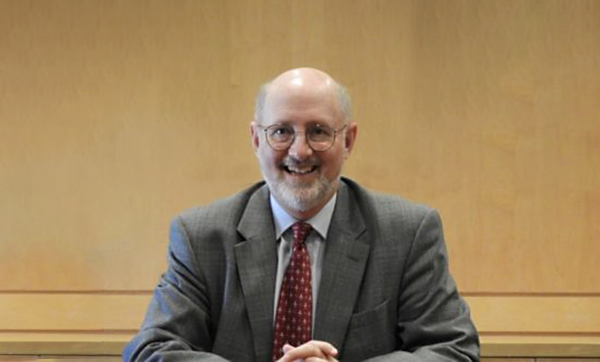In Memoriam: George R. Seage III.
George R. Seage III, a beloved adjunct professor of epidemiology, prominent epidemiologist, and alum of the School of Public Health, passed away on January 2 after a months-long battle with acute myeloid leukemia.

Seage’s love for epidemiology shone throughout his professional career, as a leader in HIV/AIDS research, a faculty member at SPH and Harvard T.H. Chan School of Public Health (HSPH), and a mentor to budding infectious disease epidemiologists. At the start of the HIV epidemic, he conveyed an early understanding of HIV transmission through his research on the long-term impacts of antiretroviral therapy among children perinatally exposed to HIV, as well as the biologic and behavioral determinants of HIV transmission and prevention.
Seage first joined the SPH community as a student, earning an MPH degree in environmental health in 1983, and a DSc in epidemiology in 1991. While working as a research assistant at HSPH during the MPH program, he met his future wife, Ann Aschengrau, who is currently a professor of epidemiology at SPH. After receiving his doctorate, Seage became a professor of epidemiology at SPH, and then an adjunct professor, after joining HSPH as a professor of epidemiology in 1999.
“George developed a substantial research enterprise to address many aspects of the HIV epidemic and oversaw several studies that have been taking place for decades,” says Martha Werler (SPH’89), chair and professor of epidemiology, who was in the DSc program at SPH with Seage. “Our doctoral program is very proud that he was able to take the research that he began in his doctoral thesis to such a stellar level, which has had uncountable impacts not only on epidemiology and HIV, on many individuals’ lives.”
Seage served as the first director of the Massachusetts AIDS Surveillance Program, and for the past 15 years, he was the principal investigator of the Data and Operations Center for the Pediatric and HIV/AIDS Cohort Study, a multi-center consortium across the US and Puerto Rico that evaluates the effect of antiretroviral therapy on the health of children infected with HIV in utero and uninfected children exposed to antiretroviral drugs in utero.
He published more than 200 publications in major scientific journals, and co-authored the textbook Essentials of Epidemiology in Public Health with Aschengrau, which has been used in introductory epidemiology courses at SPH and other institutions. Seage received multiple awards for his work, including the Massachusetts Governor’s Award for Outstanding Contributions to AIDS Research and the SPH Alumni Award.
Fellow classmates and colleagues remember Seage’s compassion and kindness as much as his intelligence and drive. SPH alums Aaron Cohen (SPH’85, ’91), consulting principal scientist at the Boston-based Health Effects Institute, and Richard Clapp (SPH’89), professor emeritus of environmental health, took classes with Seage and Werler in the DSc program.
“Over the years, as epidemic infectious disease was increasingly in the news, and especially now in these times of COVID, I often thought of George,” says Cohen. “In the early 1980’s when we were fellow BUSPH doctoral students, he was the only one in our small pre-doctoral cohort who was working on infectious disease, and even then he was a leader in HIV research and the public health response in Boston.
“He brought to that work a rare combination of compassion and deep human feeling, public health focus and methodologic rigor, which characterized his work as a researcher, teacher and author in the decades that followed,” Cohen says.
“I got to know what a kind and decent man George was in courses and a qualifying exam study group that we formed,” says Clapp. “George, Martha, Aaron, and I considered ourselves “litter-mates” because we were learning from each other and from our courses together, and we stayed friends over the decades since. George has left an amazing legacy in publications, mentees and colleagues who are grateful to have known him over the years.”
Eleanor Murray, assistant professor of epidemiology, says Seage’s passing is “a huge loss for the epidemiology community.” Seage was a member of Murray’s doctoral dissertation committee while she was a doctoral epidemiology student at HSPH, and he was also a co-investigator on her first National Institutes of Health-funded grant.
“George was not only a truly exceptional epidemiologist, but also a kind and committed mentor,” says Murray. “He encouraged us to reach for our dreams, but also to remember to make sure we were living full lives outside academia, too. Like many of his mentees, it feels hard to imagine how I’ll navigate academia without his guidance and support, but I am so grateful to have been able to learn from and work with George.”
In lieu of flowers, memorial donations in Seage’s name may be made to The Leukemia And Lymphoma Society or the Dana Farber Cancer Institute’s in-patient hematology program. Due to the COVID-19 pandemic, the family has chosen a small, private funeral service. At his request, a celebration of Seage’s life will be held at a later date.
Comments & Discussion
Boston University moderates comments to facilitate an informed, substantive, civil conversation. Abusive, profane, self-promotional, misleading, incoherent or off-topic comments will be rejected. Moderators are staffed during regular business hours (EST) and can only accept comments written in English. Statistics or facts must include a citation or a link to the citation.